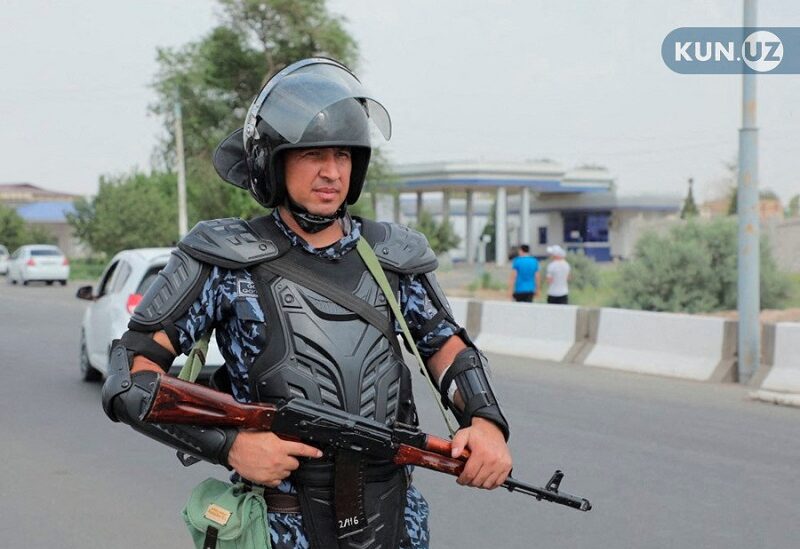
An Uzbek law enforcement officer guards a street in Nukus, capital of the northwestern Karakalpakstan region, Uzbekistan July 3, 2022. KUN.UZ/Handout via REUTERS ATTENTION EDITORS - THIS IMAGE HAS BEEN SUPPLIED BY A THIRD PARTY. NO RESALES. NO ARCHIVES
Following the release of a draft constitutional referendum that would have extended presidential terms and revoked the republic’s autonomy, Uzbek President Shavkat Mirziyoyev to announce that the republic’s autonomous status would remain unchanged, as protests escalated over the weekend in and around Karakalpakstan’s capital, Nukus.
According to official reports, demonstrators tried to seize government buildings. “There were victims among the civilians and law enforcement officers,” Mirziyoyev said in a written statement in which he also declared a monthlong state of emergency in Karakalpakstan, which lies in northwestern Uzbekistan.
Neighboring Turkmenistan and Kazakhstan, Karakalpakstan has a population of just under 2 million — or a little over 5% of Uzbekistan’s more than 36 million people — but spans nearly 40% of the country’s territory. With a strip of coast along the evaporating Aral Sea, Karakalpakstan consists mostly of desert and, therefore, lacks rich soil. The republic’s unemployment rate is high, and Karakalpakstan is economically dependent on the rest of Uzbekistan.
The Karakalpak people — whose name translates to “Black Hat,” which many of them wear — are an ethnic minority who speak a language related to but distinct from Uzbek. The Karakalpak language, like the Kazakh language spoken across the border, belongs to the Kipchak branch of the Turkic family, while Uzbek belongs to the Karluk branch, which is shared with the Uyghurs in western China.
Having settled in the region around the Amu Darya river in Central Asia during the 18th century, Karakalpaks came under Soviet Russian rule in 1920. In 1925, Karakalpakstan was established as an autonomous province of the Kazakh Autonomous Soviet Socialist Republic.
The region came under the administration of the Russian Soviet Federative Socialist Republic in 1930, and in 1932 the Karakalpakstan Autonomous Soviet Socialist Republic was formed. It was made part of the Uzbek Soviet Socialist Republic in 1936, but retained its self-determination, becoming the only autonomous republic in Soviet Central Asia. Karakalpakstan declared independence from the Soviet Union in 1991, and rejoined Uzbekistan in 1992, on the condition that it retain its autonomy.
Fate in referendums
In 1993, Karakalpakstan signed a 20-year reunification agreement with the central government in Tashkent, which guaranteed the republic’s constitutional right to withdraw via referendum from Uzbekistan. According to the agreement, after 20 years, the parties would either extend the agreement or Karakalpaks would hold a referendum on leaving Uzbekistan. But there was no vote in 2013.